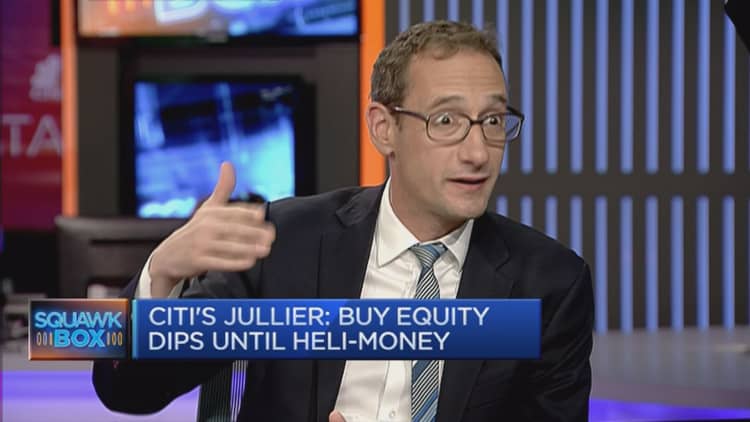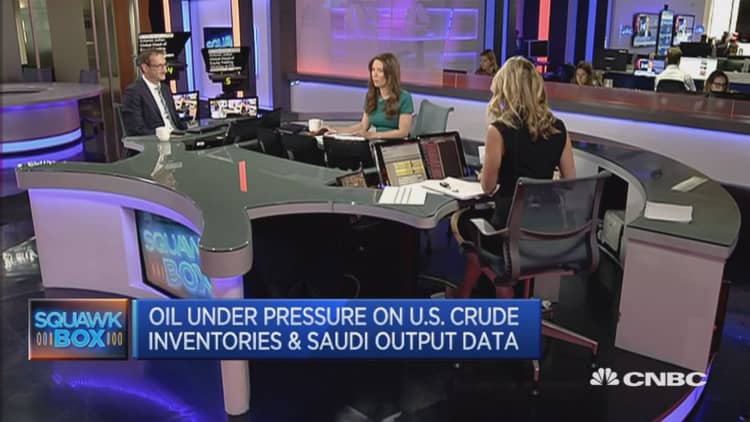
Ultra-low and negative bond yields may push debt investors to look at equities with bond-type characteristics, the global head of equity trading strategy at Citi told CNBC on Thursday.
Antonin Jullier called these investors "bond refugees" and said they were interested in stocks that had "low volatility, will not tend to sell off dramatically when there is a market hiccup and will pay a dividend."
"As returns are getting less exciting on the bond side, (investors are saying,) 'what can we look at in equities, which looks as close as possible to a bond?'," Jullier told CNBC Thursday.
The global stock of negative-yielding sovereign debt stands at over $11 trillion, according to Fitch Ratings. Government bond-buying programs from the likes of the Bank of England and negative-interest rate policies from the likes of the European Central Bank (ECB) have helped push bond prices higher and yields lower. Yields have an inverse relationship to the price.
Benchmark 10-year U.K. gilts yielded 0.535 percent on Thursday, having hit a record low of 0.515 percent on Wednesday after the Bank of England failed to meet it bond-buying target in its revived asset-buying program.
Gilt yields
U.K. Government Bonds (GILT)
Meanwhile, securities like 10-year Swiss notes and German bunds — viewed as a safe-haven asset akin to U.S. Treasury notes — are trading with a negative yield. In effect, this means debt holders are charged interest for purchasing these government bonds.
"Unless you are assuming outright deflation, recession and a very bleak world in front of us, it is a bit of a struggle to understand how you are going to make returns on something that is already yielding negative on a 10-year basis," Jullier told CNBC.
"I guess that explains why equities have been running so much — it is the asset class that can still offer yield, which is dramatically more exciting than the bond one," he added.
The Dow Jones industrial average and the — the U.S.'s major stock indexes — have regularly hit new record highs in 2016, after a seven-year bull run. It has been a wobblier ride for the pan-European STOXX 600 index, which has declined by around 5.7 percent since the start of 2016, after record highs in 2015.

Jullier was equivocal as to how much further equities had to run.
"We are starting to feel a little bit toppish, but the flows are still going that way. So it is really trying to balance the inflows which should take us higher with the fact that we are getting a little bit of exuberance," he told CNBC.
He added that most companies' dividends were unsustainable in a world of low growth and weak inflation — which could be a deterrent for investors.
"When an investor is looking for an equity dividend, it has got to be sustainable. So no, it is not sustainable on average. But you can try and filter or screen for companies that have more free-cash flow generation and therefore can cover the dividend. You can look at companies that are already sitting on cash or could raise more debt in a world where it is actually quite easy to sell debt to be able to buy a dividend," Jullier said.
Bonds from highly rated sovereigns with still-positive yields may appeal to those unable to invest outside the debt world, or to those who are too risk adverse.
"The U.S., Canada, the U.K. — and maybe even Australia — they are looked at as safe economies, but have not pursued negative interest-rate policies (that have helped lead to negative yields)," Karen Schenone, a fixed income product strategist at BlackRock, told CNBC this week.
Treasury yields
U.S. Treasurys
On Wednesday, economists at the International Monetary Fund said in a blog post that the ECB's negative-interest rate policy had proved effective, but that further cuts might hurt commercial banks' profitability. It concluded that the euro zone central bank might need to rely more on asset purchases in future for monetary stimulus.
"I think the jury is going to have to be out on what the end-result on negative interest rates is for the next few years," BlackRock's Schenone added.

